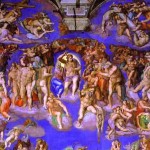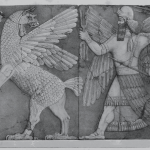Is Atheism Wishful Thinking?
by Fr. Dwight Longenecker
Filed under Atheism
One of the jabs atheists make towards Christians is that our religion is all wishful thinking.
They like to blame us for believing in "a sugar daddy in the sky"–a kind of invisible Santa Claus who is going to make everything okay one day. When we die we’ll all go to a happy family reunion and all the nasty stuff will go away. If we hold on tight for a few years here, we’ll just go upstairs for the big party.
We are also supposed to believe in a God who answers prayers here below and gives us goodies if we’re good. They imagine that we believe God is like a great big vending machine. We put our prayer in the slot at the top and the candy pops out into the tray in the bottom.
I’m afraid there probably are some Christians who have such a facile, childish, superstitious view of God and their religion, and Protestant Christianity has often sold this sappy, sentimental “pie in the sky when you die” version of the faith.
But Catholicism is more robust. We believe that sometimes God doesn’t give us candy. He gives us our vegetables and expects us to eat them in order to make us stronger, and when we die we don’t all expect to fly straight to heaven for the eternal family reunion. We go to a place called purgatory where we have to finish our greens, do our homework, pay for our misdeeds, breathe a sigh of sorrowful relief that we didn’t go down below, and continue to look upward for the day when we do pass through to heavenly bliss.
Even this more common sense and tough understanding of the afterlife is dismissed as silly wishful thinking.
But is it really?
There are two problems with calling the Catholic view "wishful thinking." First of all, Jesus calls me to give up everything I have (Lk 14:23), be prepared to break with my family (Lk 14:25-27), and eventually take up my cross and follow him (Lk 9:23). This is the cost of being his disciple. This is not exactly what I would have wished for had I been engaged in a daydream of wishful thinking.
Secondly, it seems to me that it is the atheist who is the wishful thinker. Faced with the universal human belief in an afterlife he looks away. Faced with the possibility that there might just be a final judgement in which he will have to give account of himself, he denies heartily that such a thing will happen.
“There is no God. There is no heaven. There is no hell. When you die you simply cease to exist.”
Now this sounds like some very serious wishful thinking because if his wish comes true, then he can live as he wishes and never has to pay the cab fare. He gets a free ride.
It is the atheist, therefore, who really thinks there will be pie in the sky when he dies, but his version of pie in the sky is a happy oblivion. It is simply going to sleep and not waking up.
Is it not in fact, simply his version of the “rest eternal” he accuses Christians of wishing for?
The possibilities of Hell and eternal torment are certainly frightening. Considering that practically every culture and religion across the world, and down the ages, have believed in the underworld and the possibility of going there, isn’t the atheist’s thinking not only more wishful, but dangerously wishful?
Many atheists identify as rational, sensible, scientific, and careful, but given the possibility that there just might be a Heaven, Hell and judgement, isn’t it the believer who is, in fact, the sensible fellow?
He may be engaged in wishful thinking, or then he may simply be playing his cards right and placing his money (and his life) on a common sense bet.
Related Posts
Note: Our goal is to cultivate serious and respectful dialogue. While it's OK to disagree—even encouraged!—any snarky, offensive, or off-topic comments will be deleted. Before commenting please read the Commenting Rules and Tips. If you're having trouble commenting, read the Commenting Instructions.













